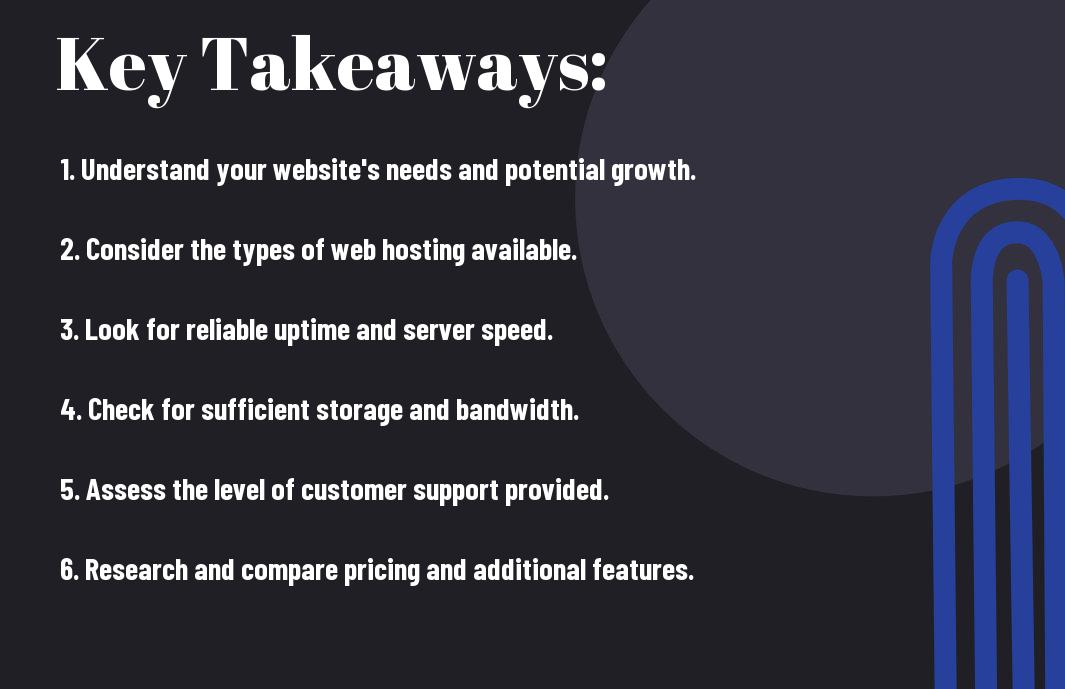Choosing the right web hosting service is crucial for the success of your website. With so many options available, it can be overwhelming to make the right decision. When considering a web hosting service, you need to carefully assess your website’s needs, including traffic volume, website type, and future growth potential. It’s also important to consider the reliability and security of the web hosting provider, as well as their customer support and pricing options. In this blog post, we will guide you through the essential factors to consider when selecting a web hosting service, ensuring that you make an informed decision that will benefit your website in the long run.
Key Takeaways:
- Understand your website’s needs: Before choosing a web hosting service, it’s essential to understand the needs of your website, including the type of website, expected traffic, and technical requirements.
- Consider different types of hosting: There are various types of web hosting services available, including shared, VPS, dedicated, and cloud hosting. It’s important to consider the pros and cons of each type and choose the one that best suits your website’s needs.
- Assess the uptime and reliability: A reliable web hosting service should guarantee a high uptime percentage, ensuring that your website is accessible to visitors at all times. Look for providers with a strong track record of reliability.
- Evaluate customer support: Good customer support is crucial, especially if you’re not tech-savvy. Look for a web hosting service that offers 24/7 support through various channels, such as phone, email, and live chat.
- Consider pricing and scalability: While cost is important, it’s also crucial to consider the scalability of the web hosting service. Choose a provider that offers room for growth and can accommodate future website expansion without incurring excessive costs.

Understanding Web Hosting Basics
Even if you’re new to creating a website, you’ve probably heard the term “web hosting” before. But what exactly does it mean? Simply put, web hosting is a service that allows individuals and organizations to make their website accessible to the world via the World Wide Web. You can think of it as renting space on a computer server where your website’s data and files are stored. If you’d like to learn more about web hosting basics, I recommend checking out this helpful guide on How To Choose a Web Hosting Provider.
Types of Web Hosting Services
There are several types of web hosting services available, each with its own unique features and benefits. The most common types include:
- Shared Hosting: where your website shares server resources with other websites
- VPS Hosting: a virtual private server that mimics a dedicated server within a shared hosting environment
- Dedicated Hosting: where your website has its own dedicated server
- Cloud Hosting: resources are spread across multiple servers, making it more scalable and reliable
- Managed WordPress Hosting: specifically optimized for WordPress websites
Recognizing the differences between these types of web hosting services is crucial in determining which one is best suited for your website.
Key Features of Web Hosting
When choosing the right web hosting service for your website, it’s important to consider the key features offered. These include:
- Storage: the amount of space allocated for your website’s files and data
- Bandwidth: the amount of data that can be transferred to and from your website
- Uptime Guarantee: the percentage of time your website will be accessible to visitors
- Support: the level of technical support provided by the hosting company
- Security: features such as SSL certificates and regular backups to protect your website and its visitors’ data
Any reputable web hosting provider should offer these key features, so be sure to prioritize them when making your decision.
Determining Your Web Hosting Needs
Despite the many options available, choosing the right web hosting service for your website can be overwhelming. To make an informed decision, you first need to determine your web hosting needs. This involves analyzing your website’s requirements and considering scalability and future growth.
Analyzing Your Website’s Requirements
When analyzing your website’s requirements, consider factors such as the type of website you have, the amount of traffic you receive, and the resources your website needs to function effectively. If you have a small blog with minimal traffic, shared hosting may suffice. However, if you run an e-commerce site with high traffic and complex functionalities, you may need a dedicated server or cloud hosting to ensure optimal performance.
Considering Scalability and Future Growth
Another important factor to consider is the scalability and future growth of your website. You should choose a web hosting service that can accommodate your website’s growth without experiencing downtime or performance issues. You may start small, but as your website gains more traffic and expands, you’ll need a hosting service that can easily scale to meet your growing needs. Look for a hosting provider that offers options for upgrading your resources, such as increased storage, bandwidth, and processing power, to support your website’s future growth.
Evaluating Web Hosting Providers
Keep in mind that not all web hosting providers are created equal. It’s important to evaluate each potential provider carefully to ensure that you’re getting the best fit for your website. For a detailed guide on how to choose a web host, you can check out this How to Choose a Web Host | 7 Tips for Picking Great Hosting article.
Reputation and Reliability
When evaluating web hosting providers, you want to make sure that they have a solid reputation and a proven track record of reliability. You don’t want your website to be hosted by a company with a poor reputation for uptime and customer service. Look for providers with strong customer reviews and a history of reliability.
Comparing Costs and Value Offers
It’s important to carefully compare the costs and value offers of different web hosting providers to make sure you’re getting the best deal for your money. Consider not only the cost of the hosting plan but also the features and services included. Use the table below to compare different providers based on their costs and value offers:
Provider
Cost (per month)
Provider A
$10
Provider B
$15
Provider C
$20
Value Offer
Provider A
24/7 customer support
Free SSL certificate
Unlimited bandwidth
Provider B
Free domain name
1-click WordPress install
99.9% uptime guarantee
Provider C
Unlimited storage
Free website builder
30-day money-back guarantee
Consider these key factors when comparing the costs and value offers of different web hosting providers to make an informed decision.

Making the Decision
For your website, making the decision on which web hosting service to choose is a crucial step. There are several factors to consider, such as customer support and service levels, security measures, uptime guarantees, and pricing. It’s important to carefully assess each of these aspects to ensure you select the best web hosting service for your needs.
Assessing Customer Support and Service Levels
When choosing a web hosting service, it’s essential to assess the level of customer support and service they provide. You want a hosting provider that offers 24/7 customer support through multiple channels, such as phone, email, and live chat. Additionally, look for a hosting service that provides quick response times and resolution of issues. Excellent customer support can make a significant difference in the smooth operation of your website.
Review of Security Measures and Uptime Guarantees
Another critical aspect to consider when choosing a web hosting service is the security measures they have in place and their uptime guarantees. You want a hosting provider that offers robust security features to protect your website from potential threats, such as malware, hacking, and DDoS attacks. Additionally, look for a hosting service that provides a high uptime guarantee, ensuring that your website is accessible to visitors at all times. A reliable hosting service with strong security measures and uptime guarantees is essential for the stability and security of your website.
Conclusion
Upon reflecting on the factors that contribute to choosing the right web hosting service for your website, it is clear that there are various considerations to keep in mind. From assessing your website’s needs to understanding the different types of hosting options available, you have the power to make an informed decision that will ultimately impact the performance and success of your website. By taking the time to research and compare different hosting providers, you can ensure that you find a service that aligns with your specific requirements, budget, and long-term goals. Remember, the right web hosting service can be the foundation for a successful online presence, so take the time to choose wisely.
FAQ
Q: What factors should I consider when choosing a web hosting service for my website?
A: When choosing a web hosting service, consider factors such as the type of website you have, the level of technical support you require, the amount of traffic you expect, and your budget. It’s important to choose a hosting service that can accommodate your specific needs.
Q: What are the different types of web hosting services available?
A: The different types of web hosting services include shared hosting, virtual private server (VPS) hosting, dedicated hosting, and cloud hosting. Each type has its own advantages and disadvantages, so it’s important to understand them before making a decision.
Q: How important is reliability and uptime in a web hosting service?
A: Reliability and uptime are crucial factors when choosing a web hosting service. A reliable hosting service ensures that your website is always accessible to visitors, and minimal downtime can have a significant impact on your website’s performance and user experience.
Q: What level of technical support should I expect from a web hosting service?
A: The level of technical support can vary greatly among web hosting services. Some providers offer 24/7 support, while others may have limited support hours. Consider your own technical expertise and the level of support you require when choosing a hosting service.
Q: How can I ensure that I choose a web hosting service that can accommodate future growth?
A: It’s important to choose a hosting service that can accommodate your website’s potential growth. Look for a provider that offers scalable hosting plans, and consider factors such as bandwidth and storage options to ensure that your website can handle increased traffic and content as it grows.



